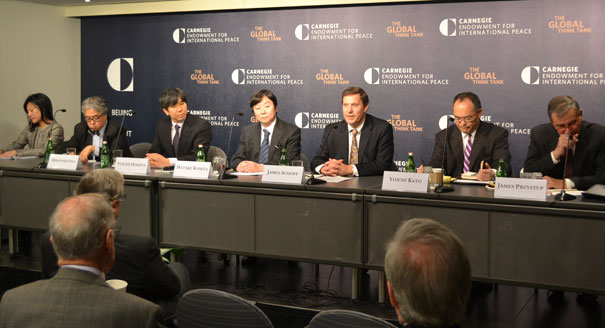Registration
You will receive an email confirming your registration.
The United States and Japan are considering significant adjustments to their security cooperation framework following last month’s historic meeting of foreign and defense ministers in Tokyo.
A panel of Japanese scholars and journalists shared their views on how the alliance might evolve under the Abe administration. American specialists also offered their thoughts. James L. Schoff moderated.
This event is co-sponsored by the Japan Forum on International Relations and the Institute for National Strategic Studies at National Defense University.
Yuichi Hosoya
Yuichi Hosoya is a law professor in the Department of Political Science at Keio University and a senior associate at the Tokyo Foundation. He is an expert in political science, and the theory and history of international relations.
Matake Kamiya
Matake Kamiya is professor of international relations at the National Defense Academy of Japan and a leading security expert in Japan. He specializes in international relations, international security, Japan’s postwar pacifism, U.S.-Japan security relations, and nuclear topics including Japan’s nuclear policy.
Hisayoshi Ina
Hisayoshi Ina is a foreign policy columnist at the Nihon Keizai Shimbun (the Nikkei Newspapers)in Tokyo. His journalistic career includes four years in Nikkei’s Washington, DC, bureau as chief political correspondent and, subsequently, as a fellow at the Foreign Policy Institute of the Paul H. Nitze School of Advanced International Studies at Johns Hopkins University.
Keiko Iizuka
Keiko Iizuka is the Washington bureau chief for the Yomirui Shimbun. She previously was a visiting fellow at the Brookings Institution, and has served as Yomirui's senior political correspondent and London correspondent.
Yoichi Kato
Yoichi Kato is the national security correspondent at the Asahi Shimbun. He previously served as bureau chief of the American General Bureau for Asahi and was a visiting research fellow at the National Defense University's Institute for National Strategic Studies.
James J. Przystup
James J. Przystup is a senior research fellow at the National Defense University's Institute for National Strategic Studies. He has worked in the legislative and executive branches, think tanks, and private industry on East Asia and the Pacific for thirty years.
James L. Schoff
James L. Schoff is a senior associate in the Carnegie Asia Program. His research focuses on U.S.-Japanese relations and regional engagement, Japanese politics and security, and the private sector’s role in Japanese policymaking.
